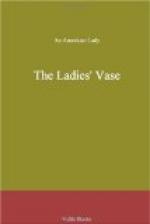A young lady once tried to describe a pic-nic party to me in the following terms: “There were ten of us—four on horseback and the rest in carriages. We set off at a glorious rate, and had a splendid time in getting there; I rode the most elegant, perfect creature you ever beheld, and capered along gloriously. When we all got there, we walked about in the woods, and gathered the most splendid flowers, and dined under the shade of a glorious old elm-tree. We had our cold provisions spread out on the grass, and every thing was elegant. We had glorious appetites, too, and the ham and ale were splendid, and put us all in fine spirits. Some of the gentlemen sang funny songs; but one sang such a dreadfully sentimental one, and to such a horrid doleful tune, it made us all miserable. So then we broke up, and had a splendid time packing away the things; such fun! I had almost killed myself with laughing, and we broke half the things. But the ride home was the most splendid of all; we arrived at the top of the hill just in time to see the most glorious sunset I ever beheld!”
In this short account, the word “glorious” is used five times, and in all but the last, it is grossly misapplied. The same is the case with the word “splendid,” except that it is not once used properly. “Elegant,” too, is equally inapplicable to horses and cold provisions. Yet this style of conversing is so common, that it hardly arrests the attention of many, who nevertheless would condemn it at once, if they thought at all about it.
EGOTISM.
Has it ever happened to any but myself, to listen to I, I, I, in conversation, till, wearied with the monotony of the sound, I was fain to quarrel with the useful little word, and almost wish I could portray its hydra head, and present it in a mirror to my oracles, that they might turn away disgusted for ever with its hideous form.
I took up my abode for some time with a lady, whose habits of benevolence were extensive, and of whose true philanthropy of heart I had heard much. I expected to follow her to the alms-house, the hospital, and the garret, and I was not disappointed. Thither she went, and for purposes the kindest and most noble. She relieved their pressing wants; ministered consolation in the kindest tone; and gave religious instruction wherever needed. But, then, she kept a strict calendar of all these pious visitings; and that, too, for the entertainment of her company. All were called upon to hear the history of the appalling scenes she had witnessed; the tears of gratitude that had fallen on her hands; the prayers—half articulate—that had been offered for her by the dying; and to hear her attestations of disregard to the opposition she had to encounter in these her labors of love. Who, with such an appeal, could withhold their commendations?




